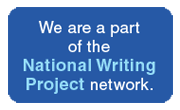NCWP Common Core Institute

The voices and expertise of classroom teachers have been utterly absent from the Common Core State Standards. It’s hard to argue this fact when you look around at all the money that private corporations and “think tanks” have poured into them, and at who has been sitting in on the meetings. If teachers are asked their thoughts, it’s usually after the fact, and more often, it’s in a hallway in a school where no one with the power to effect change is really listening.
But it doesn’t have to be that way. In January, 2013, teacher consultants from the Tar River Writing Project and the UNC-Charlotte Writing Project met for a three-day weekend in Raleigh, NC, to unpack for themselves what the Common Core State Standards (CCSS) were saying. What, we wondered, are these standards asking of students? What, of teachers? What assumptions do they make about what it means to be “college and career ready”? And how might teachers go beyond the functionalist bent of CCSS to engage the whole student? And most important, how might teacher professionals speak back to the assessment measures which seem to have been designed to hurt students and to limit achievement?
Over the course of the weekend, teachers took time to explore the conversations around CCSS in their own schools and districts, asking which stakeholders were saying what, in what contexts, and to what effect. We shared what we had been told — by principals, district administrators, other teachers, paid consultants — and we wondered about the broad conversation that makes up CCSS. In short, we applied CCSS standards to CCSS: we examined claims and warrants and we attempted to locate our own questions and concerns in that conversation. In other words, we were practicing a curriculum that we are being asked to preach, only engaging in a more authentic notion of “argument” and “writing” than we have been seeing in most of the discourse around those terms in CCSS.
We also spent a good deal of time thinking with each other about the different projects our two sites have been engaged in “at home” regarding CCSS; through this “thinking with” process, we were able to explore revisions to our professional development projects for the coming summer and fall. Teachers were especially excited about the contributions they might be able to make to the North Carolina English Teachers Association Annual Meeting in Wilmington, NC, in October. After a disheartening discussion of how both Smarter Balanced and PARCC, the two consortia charged with developing “standardized” assessments of CCSS, had turned to “robo-grading” (having computer rather than people “read” and “evaluate” student writing) for efficiency’s sake, we turned our attention back to what we could do for ourselves and other teachers. Through local professional development, and through a “Makers’ Faire” at NCETA, we hope to engage with our teacher colleagues about CCSS and really see where teachers might begin to lead the way with standards and student achievement.
[imagebrowser id=4]
When we left on Sunday, we all agreed that we needed many more such weekends together. As teachers, we are increasingly alienated from each other, but we need opportunities to work together, across content areas, grade levels, and geographical boundaries, so that we can be the best teachers possible. These working weekends keep us grounded, energized, and excited about teaching.









